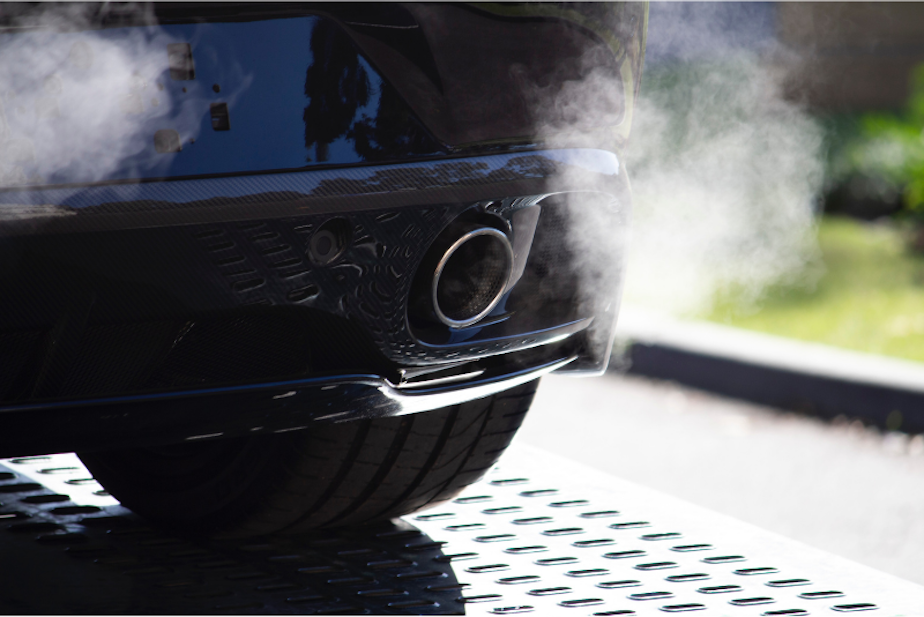Gov. Inslee signs flurry of anti-pollution laws, draws ire with vetoes

Washington Governor Jay Inslee signed a sweeping set of new environmental laws Monday. He also vetoed some of their key provisions, drawing criticism from both Democratic and Republican lawmakers.
The five new laws aim to tackle pollution from fossil fuels and petroleum products as well as the various harms they do to the global climate, human health, and sea life:
- Creating a “cap-and-trade” system to limit carbon emissions from the state’s biggest polluters
- Creating a “low-carbon fuel standard” that requires cars and trucks to shift to cleaner fuels in the coming years and make the daily commute less of a threat to the global climate.
- Requiring seven state agencies adopt an “environmental justice” approach, aimed at prioritizing the needs and voices of the state’s most-polluted communities.
- Banning most uses of polystyrene foam (commonly, but incorrectly, known as Styrofoam) and reducing restaurants’ use of disposable cutlery.
- Banning the long-lasting, heat-trapping superpollutants known as HFCs (hydrofluorocarbons).
The newly signed “Healthy Environments for All” act aims to undo environmental injustices often faced by people of color.
RELATED: Flanked by families, Inslee signs a dozen police reform bills into law
Under that law, the departments of Agriculture, Commerce, Ecology, Health, Natural Resources, and Transportation and the Puget Sound Partnership are required to put the most-polluted communities first in their projects and policies.
“In my district, I don’t want one more auntie to die 10 years too early because of the air she breathes," said Rep. Kirsten Harris-Talley, one of the bill’s sponsors. "I don’t want one more child to have asthma just because of their ZIP code."
Sponsored
Harris-Talley, a Democrat, represents southeast Seattle and Renton.
“Every quarter mile you get closer to a freeway, the asthma rates skyrocket,” Inslee said. “Every Washingtonian deserves the right to breathe clean air.”
The measure requires transportation, health and other departments to apply “environmental justice” principles to their work.
Backers say the law will make decision making more equitable and give a meaningful say in government to the people who need it most.
“Now the real work starts,” said James Rasmussen of the Duwamish Tribe and the Duwamish River Cleanup Coalition at the bill-signing ceremony held at the tribe’s longhouse and cultural center. “We have a tool. We have to use it.”
Sponsored
Opponents say the environmental justice measures add more layers of bureaucracy.
The bill is watered down from an earlier version. A new Environmental Justice Council can only make recommendations, instead of requiring reforms at the agencies.
Vetoes draw opposition
Inslee vetoed key sections of the fuel and cap-and-trade bills that would have prevented those measures from taking effect until the state passes a 5-cent-per-gallon gasoline tax to fund new transportation projects.
Transportation is the state’s largest source of climate-wrecking carbon pollution, and spending to expand highways usually leads to more driving and more emissions.
Sponsored
Inslee said he vetoed the linkage to transportation spending to avoid bogging down the climate measures that he has been pursuing for years.
“We no longer have time to delay to save ourselves from climate change,” he said. “Our people can’t wait any longer.”
"Governor Inslee is once again overstepping his veto authority and ignoring the state constitution,” House Republican Leader J.T. Wilcox said in a statement issued Monday.
The state Legislature has successfully sued Inslee to overturn previous line-item vetoes.
“We will ask the Washington courts to again rule on the balance of legislative and executive branch powers,” Democratic House Speaker Laurie Jinkins said in a separate statement issued Monday.
Sponsored
Another line-item veto of the cap-and-trade law, dubbed the Climate Commitment Act, led a handful of protesters to disrupt Inslee’s televised bill-signing ceremony at Shoreline College for several minutes.
Inslee vetoed a requirement for tribal consent to how the state spends money raised by the sale of carbon permits.
“There are legal concerns with the undefined and broad requirement for tribal consent in the use of climate investment funds and for the lack of due process when consent is withheld,” Inslee said.
Hearing that, a man began yelling from the audience.
“Why would you sell us out? We helped you get this bill in!” he shouted at Inslee. “The climate commitment act? You vetoed your commitment to consultation with our Washington state tribes. That is shame!”
Sponsored
“Shame!” chanted a few protesters.
Inslee said he’d be happy to talk with the man after the ceremony.
The governor’s office said it had no information on the man, and KUOW was unable to identify him.
“You don’t care about our culture,” the man yelled at Inslee.
“We heard you, sir. Now it’s time to sign some bills,” the governor said.
The man was escorted from the room by campus security guards.
“Fighting climate change isn’t easy,” Inslee said once the room quieted down. “It requires change, and there’s controversy associated with that, as we just recognized. We’ve made decisions that are going to save Washington state for everyone.”
Inslee said he would hold a summit with tribal leaders to devise proper government-to-government consultation over the state’s climate spending in a way that respects the mutual sovereignty of the state and tribal nations.




